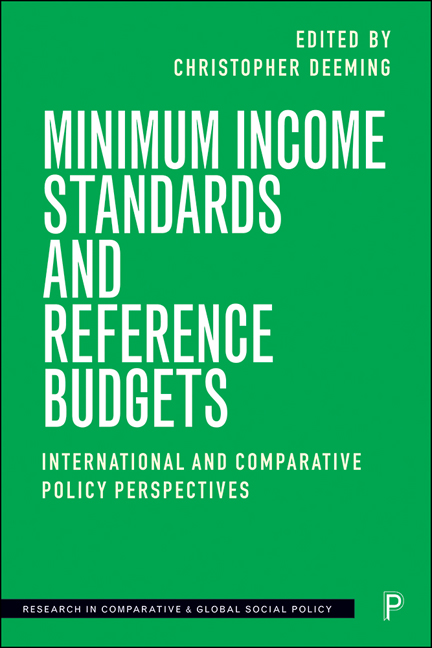6 - Measuring Needs and Setting Standards in Singapore
Published online by Cambridge University Press: 12 March 2021
Summary
Introduction
Singapore's first study on Minimum Income Standards (MIS) focusing on older people was completed in 2018. The study took place in the context of rapid demographic ageing and an income security regime built around a defined contribution pension scheme and intergenerational family support. Moreover, social policies in Singapore tend to lack transparent numerical benchmarks and policy making is not systematically informed by clear notions of needs and standards. With some adaptations, the MIS approach developed in the UK was used to generate a definition of a basic standard of living in Singapore and separate budgets for four household types: elderly man living alone (aged 65 and above), elderly woman living alone, elderly couple, and older man or woman living alone (aged 55 to 64). This chapter sets out the background of the study, presents its method and findings, and explains the significance of introducing MIS to a policy setting such as Singapore.
Income security and policy making
Singapore has one of Asia's fastest-ageing populations (UN, 2018). Increasing life expectancy implies more years in retirement and has made old age income security one of the most pressing policy concerns. The worry is also especially acute as co-residence with adult children and their cash contributions have traditionally been the pillar of income security for elderly persons in the absence of comprehensive formal social security (Ng, 2011a). As family sizes shrink, access to income support from children is projected to decline (Ng, 2015). Co-residence rates have also been steadily declining. At the same time, there are still gaps in income security policy. The primary source of public pensions is the Central Provident Fund (CPF), a defined contribution scheme which attracts mandatory monthly contributions from both employer and employee, and pays an annuity from the age of 65 (CPF Board, 2018). The amount of payment depends on how much savings the individual has accumulated and there are no separate non-contributory pensions. A means-tested public assistance scheme covering less than 1 per cent of the elderly population has been the primary recourse for persons with insufficient incomes (MSF, 2018a, 2018b).
In recent years, several new schemes have been introduced to supplement the CPF and public assistance, such as the Goods and Services Tax (GST) Voucher – Cash (MOF, 2018) and Silver Support Scheme (MOM, 2018a).
- Type
- Chapter
- Information
- Minimum Income Standards and Reference BudgetsInternational and Comparative Policy Perspectives, pp. 83 - 96Publisher: Bristol University PressPrint publication year: 2020



